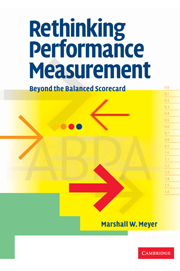1 - Why are performance measures so bad?
Published online by Cambridge University Press: 14 May 2010
Summary
A brief detour into abstraction may help illuminate why performance measures are often unsatisfactory and why performance measurement often proves frustrating, especially in large and complicated firms. Outside of the realm of business and economics, performance is what people and machines do: it is their functioning and accomplishments. This is codified in the dictionary. For example, The Oxford English Dictionary defines performance as:
Performance
The action of performing, or something performed … The carrying out of a command, duty, purpose, promise, etc.; execution, discharge, fulfillment. Often antithetical to promise … The accomplishment, execution, carrying out, working out of anything ordered or undertaken; the doing of any action or work; working, action (personal or mechanical); spec. the capabilities of a machine or device, now esp. those of a motor vehicle or aircraft measured under test and expressed in a specification … The observable or measurable behaviour of a person or animal in a particular, usu. experimental, situation … The action of performing a ceremony, play, part in a play, piece of music, etc….
In other words, performance resides in the present (in the act of performing or functioning) or the past (in the form of accomplishments) and can therefore, at least in principle, be observed and measured. Performance is not in the future. To repeat the phrase I have italicized, performance is often “ … antithetical to promise.”
Economic performance, by contrast, involves an element of anticipation if not promise.
- Type
- Chapter
- Information
- Rethinking Performance MeasurementBeyond the Balanced Scorecard, pp. 19 - 50Publisher: Cambridge University PressPrint publication year: 2003
- 5
- Cited by

